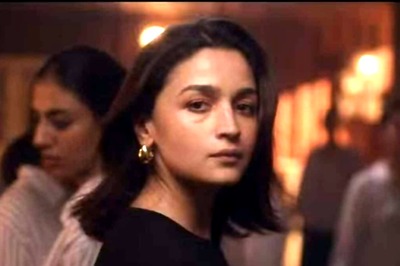
views
'Twelve persons, twelve sms-es and twelve months' reads the poster of new Bengali film Uro Chithi (director: Kamaleshwar Mukherjee). The film starts and ends with a year in between for protagonist Aniket, a corporate 'slogger'.
No one actually counts if there are 12 sms-es in all but you can rely on the director for this. But definitely the 11 persons who come close to Aniket shape him and control him to an extent.
Too many people you may think are cramped in the film – reason why few of them remain half-cooked and vague. For example Rohit – the financial advisor of Aniket or the prophetic teacher Farhad play to the gallery with philosophical overtures but end up being unconvincing.
The father, a botanist by choice who stayed for long in the UK and then returned to run an old-age home is similarly lacking proper justification apart from a climactic sequence where Aniket gets amorously involved with Lilette, the air-hostess when the father passes away.
However, the triumph of the film is in the depiction of Aniket's character. This is a person here, who is fatigued to meet his corporate deadlines and presentations and tries to look at his life afresh now. Just about in his forties, Aniket is confused. The turmoil in the share market adds to his misery, and he finds solace in the arms of Lilette.
Aniket is the face of Bengali urban youth – for whom even sky is not the limit, he flies higher up and is lost in the whirl. Aniket, apparently has all an upwardly mobile Bengali middle-class man aspires for – a caring wife, a doting daughter, a decorated home and a Maruti car.
But deep within there is an artificiality of this pomp, a superficial veneer to the haphazard ensemble called life.
It's the passion to rekindle hope for one's own self and the others round him or her which is so haplessly missing in the lives of the urban corporate that it follows the Aesopian ways – grass is always greener on the other side. Aniket hence lights up fire in his hit-up with Lilette ignoring his wife who is burdened now with the household chores.
In some very smart moves the director bares us with the impertinence of these so-called relations – Lilette once asks Aniket "What you want" to which he replies "To be with you" and she reverts "No, to sleep with me". Lilette goes along saying that the body is not so important probably. But can body be isolated from the soul? Probably not. And that is why we find her in love with him – and understand how helpless the individuals are in controlling their mind and their decisions.
Near the end of the film where Lilette confesses she has HIV+, Tanusree Chakraborty as Lilette caresses us with her deep sense of loss and longing and her plea "Baba-r kachhe jabo" ("I will visit my father"). Though the environment and the magnitude are different yet somewhere suddenly Meghe Dhaka Taara's Neeta comes up to us.
They are separated by decades and conditions, yet they are harmonious in their wish to live life. Seeing Aniket break down, Lilette justifies vehemently "Don't worry, we used condoms". Is this the urban fallacy – Aniket breaks even more because she is his hope, his only sense of joy in his claustrophobic life?
Kevin, played by Rudraneil and his fashion designer partner played by Sudipta are the foils to Aniket's life, his mentors to the other world. Like most of his peers in real life as well, Aniket is introduced to this world of booze, drugs and glam girls. He loses himself, spends money and becomes emotionally bankrupt apart from the fact that he finds Lilette here.
Then there are the typical colleagues – two in this case who wear masks of good and evil. Manish who appears to be a rebel in the organization (as opposed to Aniket who is more of a diffident), turns out to be a manipulator who power trips others towards his personal promotion. Shalini, Aniket's sultry boss on the other hand is a victim of corporate cauldron though her character swing was too much to take in the end where she seems emotionally overt for Aniket.
Suhas and Sudha – the other couple in the film tread the line of existence which often tends to be portrayed in a melodramatic way. It is to the credit of the director and Biswanath who plays Suhas that the characters remain grounded. Grounded in misery, in living a rudderless life, a life where money only talks. In this fast changing urban world of multiplexes and flyovers, of malls and glamour girls what happens to the factory worker whose factory shuts down? What happens to the hawker who wakes up at 4 in the morning and prepares for his business? We ignore them largely; we choose not to look at those lives until their lives prick us somewhere.
The day they will just pass in front of our eyes like walking mannequins, we will fit in unobtrusively to the life depicted in advertisement hoardings!
Suhas is close to heart for being simple, for being honest and not because he is a 'defeated' individual but more because he takes life head on with his meager means. And who is Aniket? Aniket is as much me as any one else. Kamaleshwar Mukherjee succeeds in putting across this all-encompassing feeling of loss and longing. His Aniket represents the vacuous existence of the so-called corporate professionals. Indraneil as Aniket is good. Srilekha, his wife moves effortlessly to put across her traumas and her island world. Biswanath as Suhas is one high point in the film who will keep you sore with his seeming nonchalance.
Tanusree Chakraborty is breathtaking as the glamourous air hostess. But she does show her acting talents in the end when she is sick. She has the looks to become a top-drawer, it remains to be seen how she managers her career.
'Uro Chithi' is a good film. It's crisp and yet it makes you laden with an inexplicable heaviness of soul. This is the director's first film and hence it is apparent that he tries to punch in too many things and characters in one go. Few could have been dispensed with to make the film look petite.
But none-the-less in the era of self indulging prophetic film makers, this film is for the urban mass that can surely recognize few of the characters. If, like this essayist, they come back in the comforts of their lonely zones to recapitulate their lives, the director’s purpose is fulfilled. Kamaleshwar raises hopes and we will surely look forward to his next work – for touching few chords in the soul and making us reflective.
####



















Comments
0 comment